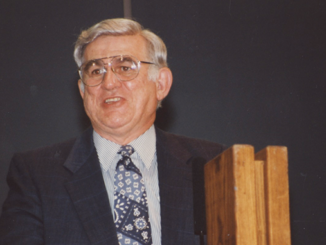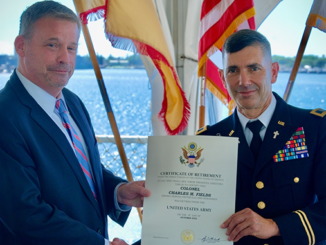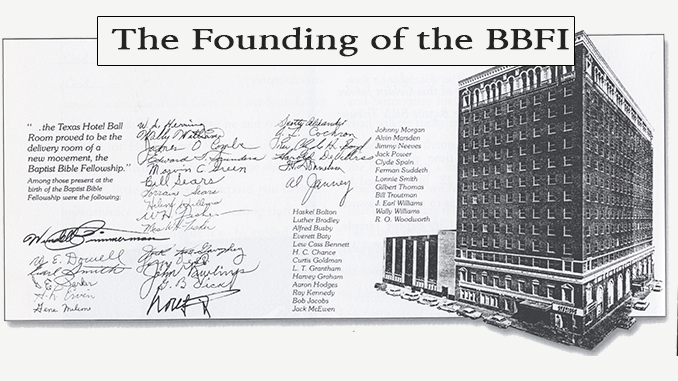
The following is taken from “The Beginnings: A Pictorial History of the Baptist Bible Fellowship, Volume 1,” written by Billy Vick Bartlett. It tells of the birth of the Baptist Bible Fellowship International during the week of May 22-24.
——————————————————-
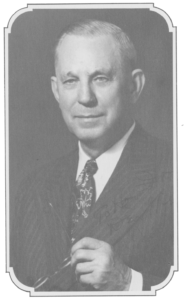
The apparent serenity was broken when the undercurrents of discontent welled to the surface shortly before the 1950 national Fellowship meeting which was held in conjunction with the graduation week exercises of the Bible Baptist Seminary. In the Spring of 1950, “the 100,000 subscribers” to The Fundamentalist were shocked to see the paper’s red headlines that had borne the praises of Vick almost weekly since 1936 now picture him as a traitor possessing the combined malevolence of “Absalom” and “Judas Iscariot.” The attack seemed completely sudden, but a judicious reading of the issues immediately preceding the Fellowship meeting attest to a strained relationship between Vick and Norris. Norris first manifested a willingness to escalate the private disagreement into a public “fight” when he attempted to regain control of the resuscitated Seminary the week before the annual national Fellowship meeting which was scheduled for the third week in May. He launched the anti-Vick campaign by making it appear that the president was mistreating the seventy-four-year-old founder of the school, Louis Entzminger. During a chapel service, Norris staged a prayer meeting for the ailing “Entz” who was supposedly convalescing in the sickbed to which he had been driven by the merciless Vick. After the ire of the student body was sufficiently aroused by the picture of their president booting out an old warrior of the faith when he was of no further use, Norris induced them to ratify a new set of by-laws which would give the First Baptist Church the sole voice in the financial and personnel affairs of the school. This move would, of course, prevent the threatened dismissal of Entzminger, which was why the students ratified the by-laws; but it would also give control back to Norris. Among the approximately twenty students who voted against the Norris ploy were twelve Temple Baptist Church members who were immediately expelled and given twenty-four hours to vacate their dormitories. R. O. Woodworth was also fired and ordered off the property of the First Baptist Church. The Temple Baptist students called their pastor in Detroit, who was then preparing to leave for Fort Worth to attend the national Fellowship meeting. He told them to “sit tight in the boat until I get there Monday.” Vick then fired off a telegram to Norris that protested his “low down tactics” and ended with the threat “I’ll meet you at Philippi.” When Vick arrived in Fort Worth with Wendell Zimmerman Monday afternoon, he found that Norris had out-maneuvered him even before his arrival. The two men were met by the erstwhile business manager, Woodworth, and a few of the expelled students. Proceeding to their hotel they learned that Norris had held an election and installed a new seminary president, Jock Troup, at nine o’clock that morning when only students and a handful of pastors were present.
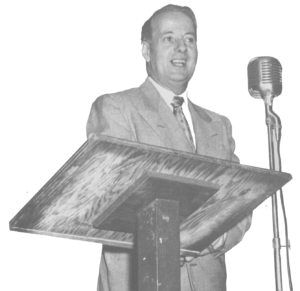
The Monday evening service proved uneventful despite the fact that handbills were distributed which accused R. O. Woodworth of misappropriating $ 10, 000 of seminary funds, but Tuesday morning the confrontation occurred. Norris’ first tactic was an attempt to keep his opponents off the platform. Despite the fact that W. E. Dowell, a Vick sympathizer, and Fellowship president, was scheduled to preside, Norris had inserted a coworker, Frank Godsoe, in the position of moderator. Godsoe took charge and announced that Norris would speak first and would be followed by Luther Peak, another Norris collaborator. To counter this move an anti-Norris contingent composed of Vick, Dowell, Zimmerman, and John W. Rawlings, pastor of the Central Baptist Church in Tyler, Texas, caucused and decided to have Dowell challenge Godsoe for the platform. Dowell calmly walked up on the platform and reminded the morning crowd of better than 1,500 that the president traditionally presided during Fellowship week. Norris, seated behind Dowell, gruffly replied that Tuesday was Seminary Day. Dowell admitted that Tuesday was Seminary Day but insisted that the Seminary was part of the Fellowship and that he still ought to preside. Finally, he turned to the crowd and said, “After all I am president. I don’t know how much longer I will be, but right now I am. How many think I ought to moderate this meeting?” The anti-Norris forces won the show-of-hands test-vote by an approximate four to one margin. The next problem was to get Luther Peak off the agenda and Vick back on. Dowell handled this smoothly. He pointed out that the controversy was well known and could only be resolved by a thorough airing of the issues. He reminded the crowd of the past issue of The Fundamentalist which had announced that Vick was to follow Norris on Tuesday morning and again put a question to the Fellowship: “How many,” said Dowell, “think it fair to hear both sides and give Mr. Vick a chance to state his case?” This vote was an even more overwhelming setback for “The Preacher,” with even some of his own adherents crossing over to vote for the motion. Vick in explaining this occurrence said simply, “Everybody loves to see a dogfight.”
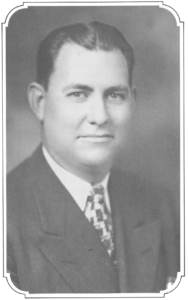
With the obstacles now removed the two men squared off with the fate of the Fellowship awaiting the decision. Those who hoped to see fireworks were not disappointed. Norris spoke for an hour, and the burden of his message centered around the emotional allegation that Vick had meted out “cruel punishment” to “Entz” who was at that time in the hospital about to undergo a gall bladder operation. Norris alluded to other issues but spoke in generalities. He apparently hoped to dissuade Vick from open rebellion by repeatedly alluding to issues he thought might arise and saying, now if I hear any more about that I’ll have more to say later.” When Vick walked up on the platform, he brought with him a large brown briefcase and began an unrelenting attack on his former boss. In a carefully documented message, he dealt with each issue in turn. To the charge of callousness evidenced towards Entzminger, he four times cited the fact that “The Founder,” as he was often called, had tendered his resignation in Vick’s two-year tenure. On every occasion, Norris had written Vick calling Entzminger “childish,” “supersensitive,” “nervous,” etc. For instance, on November 3, 1948, Norris wrote:
“I have just had a talk with Entzminger and he says that he has written you that he is going to resign. I think it best to accept it. He has been in such an unsettled state of mind and we can’t go on that way forever…. He went over everything with me, none of which I can seem to do anything with. He has that peculiar super-sensitiveness that comes to all old preachers. I guess I may have it, but I hope somebody will knock me in the head if I get a bad case of it, that I may get over it or have my funeral.”
The Detroit preacher then proceeded to the question of the “cooked-up bylaws,” as he termed them and explained the nuances of each point to the audience. He pointed out that they gave “Russian veto power” over the Seminary to the First Baptist Church. “And when you say the First Baptist Church,” said Vick, “you might just as well say one man”; and he turned and pointed at Norris seated behind him. He continued, “If you want to support an institution operated in such a manner—fine; but I don’t.” While Vick was speaking, “Miss Jane” Hartwell, Norris’ secretary of thirty-three years standing, was pacing the floor of the general office listening to the proceedings in the auditorium. As Vick neared the end of his message she remarked, “The Preacher has never lost a fight in his life, but he’s losing today.” Vick’s closing remarks concerned the “Russian type election” Norris staged in which those voting against his proposal were expelled. The constant references to Soviet tactics particularly rankled the avidly anticommunistic Norris. Vick ended his ninety-minute message by resigning his post as president of the Bible Baptist Seminary.
After Vick’s resignation delegates from every corner of the auditorium clamored for recognition from the presiding officer. Not surprisingly, Dowell recognized a sympathizer, Wendell Zimmerman. Zimmerman moved that the Fellowship refuse the proffered resignation and began to ask some poignant questions concerning the origin, scope, and legality of the “cooked-up by-laws. ” Bob Ingle, a pastor from Florida who eventually sided with Norris, suggested that a committee composed of five from each camp and one disinterested party be appointed to investigate the origin and legality of the new by-laws. Before the will of the Fellowship could be ascertained, however, the man once considered the most powerful figure in the fundamentalist movement bolted from his chair and started for the lectern shouting, “there’ll be no committee—there’ll be no committee.” Dowell informed “The Preacher” that he had not secured recognition in the prescribed manner and that he was out of order. Norris replied, “Are you going to try to stop me from speaking from my own pulpit?” At this point, Dowell realized that it might react against him to push the issue further; and he stepped aside and turned the pulpit over to Norris. Norris told the crowd that there was not going to be a vote on Vick’s resignation; there was not going to be a committee; and if he were opposed further, he would shut the doors of the First Baptist Church. He finished his tirade by waving his hand in a gesture of dismissal and stated in a more relaxed tone, “Beauchamp and I will go out to lunch and settle this thing between ourselves.” The meeting was then formally dismissed by Dowell.
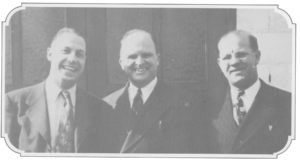
The noon attempt at compromise proved to be brittle. When the two leaders settled into their chairs at the Westbrook Hotel in Fort Worth, Norris broke the icy silence by asking Vick his terms for settlement. Vick stated that first the expelled Temple Baptist Church students must be reinstated. Second, since he had resigned his position at the college, Norris must resign as co-pastor of the Temple Baptist Church in Detroit. Finally, Norris would have to acquiesce to the establishment of an additional Fellowship school which would be structurally within the World Fundamental Baptist Missionary Fellowship but autonomous in its management. The Fellowship churches would then choose individually which institution they desired to support. Norris quietly acceded to the three conditions and the agreement was to be duly reported to the Fellowship during the afternoon session.
The afternoon session nearly proved disastrous to the anti-Norris faction. During the noon hour, someone conjectured that Norris might “get to” Vick and they would be “sold down the river.” Norris spoke first during the afternoon session. He began his short message by reading from the Old Testament where Abraham in a disagreement with his nephew, Lot said, “Let there be no strife, I pray thee between my herdmen and thy herdmen; for we be brethren.” He then briefly discussed the noon compromise in glowing terms of harmony and turned the platform over to Vick. Years later, when questioned about the misinterpretation of the compromise in his own ranks, Vick replied, “He intimated a little more than had happened, but it was a pretty factual report—for him.” Vick then proceeded to generally reiterate what his former mentor had said and put in a plug for the proposed new school to open in Springfield, Missouri, the following September. At the end of Vick’s remarks, Norris approached him and embraced him warmly. Such a display, however, evoked an unexpected reaction from Vick’s allies. Noel Smith, the former editor of The Fundamentalist who had walked out of Norris’ church the previous Sunday, interpreted the scene as an indication that the anti-Norris proto-organization that had been triggered by Norris’ attempted takeover had been basely betrayed and convinced W. E. Dowell of the same. As the dissentients gathered toward the rear of the auditorium the reaction snowballed; and doubt hardened into assurance of their betrayal. What could have been a disaster was averted when a senior student at the Seminary, Curtis Goldman, discerned the misunderstanding and related to Vick the distraught condition of his group. It took Vick but a few moments to gather the troops and assure them that all was proceeding “as they had planned.” Although some, notably Wendell Zimmerman, were dissatisfied with the extent of the revolt and advocated the initiation of a new Fellowship, Vick was no longer suspect.

After the uneventful Tuesday evening service the anti-Norris contingent caucused in a conference room at the Blackstone Hotel to discuss plans for the opening of their school. R. O. Woodworth was instructed to secure the Ball Room of the Texas Hotel for an enlarged meeting of all interested pastors for the following noon. At this meeting Wendell Zimmerman renewed his campaign for a complete break with the World Fundamental Baptist Missionary Fellowship. As Cato on the destruction of Carthage, Zimmerman injected his message whenever a propitious moment arrived, but little came of it at this time. Perhaps this was because Vick was diametrically opposed to it. At length, however, he had convinced everyone but Vick, who still insisted on staying within the structure of the old Fellowship. Years later Vick explained his position as follows:
“Wendell’s position was that after the bitterness of the fight, harmonious interaction would be impossible, and as it turned out, he was right. Why did I resist at first? Well, I loved the old Fellowship, had helped build it, had been president of it, and had poured thousands of dollars into it. It was difficult to just turn it over to Norris and that crowd when we were the majority group. If the fight had been doctrinal, then I would have left it immediately; but it was essentially the crookedness of one man, who would not be around forever.”
By Wednesday morning the first evidence of a crack in the patched-up relationship had developed. Vick went to Norris’ office preceding the morning session and asked permission to announce the noon planning session preparatory to the launching of the Springfield Bible college. He told the controversial Texas preacher that he could just announce it before anyone is able to stop him or request that the moderator, W. E. Dowell, inject it during the program; but that it was, after all, his (Norris’) pulpit and he would not do it without his permission. As Vick remembered the scene, there was a long pause as Norris weighed the ramifications of the situation before he remarked, “I don’t think there ought to be an announcement.” Vick assured him that although an announcement would facilitate matters, one was not obligatory, and his wish would be honored. This was the first manifestation of ill-will toward the new educational venture, however, and it must have been apparent to the new school advocates that peaceful coexistence between the two factions was unlikely. Vick left Norris’ office and instructed Woodworth to stand in the lobby and inform the pastors he knew were sympathetic of the luncheon at the Texas Hotel.
At the dismissal of the morning session around a hundred pastors made their way the six blocks distance to the Texas Hotel, and its Ball Room proved to be the delivery room of a new movement, the Baptist Bible Fellowship. W. E. Dowell moderated the meeting and some progress had been made on the new educational venture when Wendell Zimmerman again propounded his conviction of the advisability of a complete break with Norris. Someone raised the question of Norris’ attitude toward the proposed Springfield school; and a preacher who had just walked into the room in time to hear the inquiry said, “I can answer that. They’ve just voted to move the Fellowship office from Springfield to Fort Worth, and they’re preaching Beauchamp’s funeral right now.” Following the announcement, many clamored for an open break with Norris; but Vick was still adamant in his refusal, wanting to investigate the matter before acting. Zimmerman, with tears in his eyes, pleaded with the Detroit pastor to capitulate, but to no avail. Finally, W. E. Dowell asked Vick if he would abide by the will of the entire group if they put it to a vote. Vick answered affirmatively; and Dowell began the voting procedure, which was a simple show of hands. Dowell phrased the question as follows: “All those in favor of severing connections with the World Fundamental Baptist Missionary Fellowship and forming a new fellowship from the ground up raise your hands.’ Everyone in the room raised a hand but G. Beauchamp Vick. He turned and surveyed the sentiment of his comrades, then smiled and raised his hand also. “The break” was an accomplished fact.
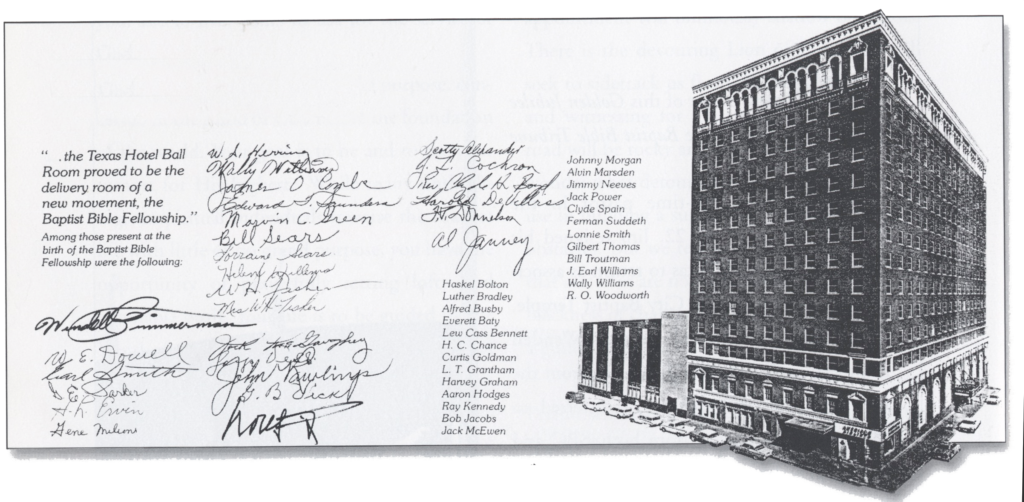
The planning session for the new college was now widened in scope to include a mission program and paper as well. It was imperative that a paper be launched immediately in order to give the new group a public voice to counteract The Fundamentalist. The founders of the new group already had forebodings of what the next issue of The Fundamentalist, Norris’ usual vehicle of political execution, would report; for it was circulated widely among the members of their respective churches. According to Woodworth, “Norris blackjacked many of those who stayed with him into doing so because they feared exposure in The Fundamentalist.
The story of “the break” would be incomplete without some mention of the publicity stunt staged by Norris three weeks after the May national Fellowship meeting. About a week after the meeting the leaders of the fledgling Baptist Bible Fellowship began to receive telegrams from Norris threatening them with lawsuits for slander. Norris then “subpoenaed” them to appear at a “hearing” to be held at the First Baptist Church; and in order to lend the affair an air of legality, he announced that a “court magistrate” would be present. Although realizing they were under no obligation to comply, several Baptist Bible Fellowship leaders answered the telegram and suggested a neutral meeting ground at the place of Norris’ choice anywhere between Detroit and Fort Worth. Norris refused the request. Next, the new group suggested anyplace in Fort Worth besides the First Baptist Church, and Norris again refused. The new Fellowship leaders then wired their refusal to comply with his request. Norris repeatedly printed challenges that dared the Baptist Bible Fellowship men to attend and made much of their refusal to do so.
The day before the hearing, however, the Baptist Bible Fellowship leaders reconsidered and impulsively started for Fort Worth. On that day W. E. Dowell, R. O. Woodworth, and G. B. Vick were scheduled to meet in Wendell Zimmerman’s Kansas City church for a further planning session preparatory to the opening of the Baptist Bible College that Fall. When Vick arrived there the other three, who had been discussing the advisability of going to Fort Worth for the hearing, broached the subject. Zimmerman said, “What do you think, Beauchamp?” and Vick replied, “Let’s go.” While they were en route, Zimmerman’s secretary, Betty Dirks, called a number of Baptist Bible Fellowship pastors in the Southwest and urged them to leave immediately for Fort Worth. At length, some seventy-five or eighty people met in front of the Blackstone Hotel and marched the three blocks to the First Baptist Church. According to Woodworth:
“It couldn’t have been more perfect if we were following a Hollywood scriptwriter. We were about fifteen minutes late and Norris was already in his tirade. He was screaming ‘where are they—the cowards—why aren’t they here.’ At that precise moment, Beauchamp, who was in the vanguard of our group, pushed open the back door of John Birch Hall and started down the middle aisle. Norris was caught completely by surprise. Finally, he said nervously, ‘You come to testify, Beauchamp?’ and Dr. Vick replied, ‘That’s the general idea.’ He (Vick) then got a chair, marched up on the platform and stationed it about four feet from the lectern on the front edge of the platform.” When asked the reason for doing this Vick said, “If I was going to hear my funeral preached, I wanted a good seat.” W. E Dowell then began shouting at Norris, “3,000 to 7,” a reference to the rejection of Norris’ half of the Temple Baptist Church pastorate by its congregation. This evidently touched a sore point with Norris, for he ordered Ralph Toney and Bluford Finch, two seminary students, to throw Dowell out of the building. The Baptist Bible Fellowship president walked over to Finch and dared him to make an attempt. According to those present, Norris was visibly shaken. He turned the meeting over to Frank Godsoe and retired to an anteroom with some of his aides to plan strategy.
After a brief period of confusion, it was announced that the witnesses would begin to testify. After the first witness was questioned by Norris, Vick was denied the right to cross-examine her, and a sharp exchange about proper procedure ensued. Vick argued that Norris had publicized that courtroom procedure would be followed; and he ended by stating, “but you aren’t keeping your word just as I expected.” Norris ended his side of the exchange by exclaiming that he did not care what was usually done, it was his hearing, his church, and cross-examination of his witnesses would not be tolerated.
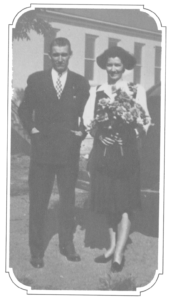
For eight hours the testimonies droned on. At length, Norris arose and announced that Moredecai Ham, the evangelist with whom Vick had served and under whose ministry Billy Graham had been converted, would close the day with an inspirational message. The announcement ignited the Springfield group who were incensed at this injustice. Vick shouted at Norris to give them an opportunity to present their side, but Norris refused with the excuse that it had grown late and perhaps the following day something could be arranged. Vick said that the meeting had been publicized as a one-day affair and that his group had made their plans accordingly. When Norris replied that this was no concern of his, Vick bolted up on the platform, pointed his finger at Norris, and shouted: “You’re the biggest coward I ever saw.” John Rawlings leaped on the mourner’s bench and began shouting (no one seems to remember just what). The Springfield contingent moved toward the platform and began carrying on a running commentary with Norris who taunted them in turn. W. E. Dowell asked for just two minutes to rebut Norris’ arguments. The editor of the Baptist Bible Fellowship paper, Noel Smith, jumped up on a chair and began shouting at Norris. “The Preacher” caustically countered by referring to the Springfield editor as “Know-All Smith.” At length, Vick, seeing that nothing further could be accomplished, gathered his forces and marched out of the auditorium.
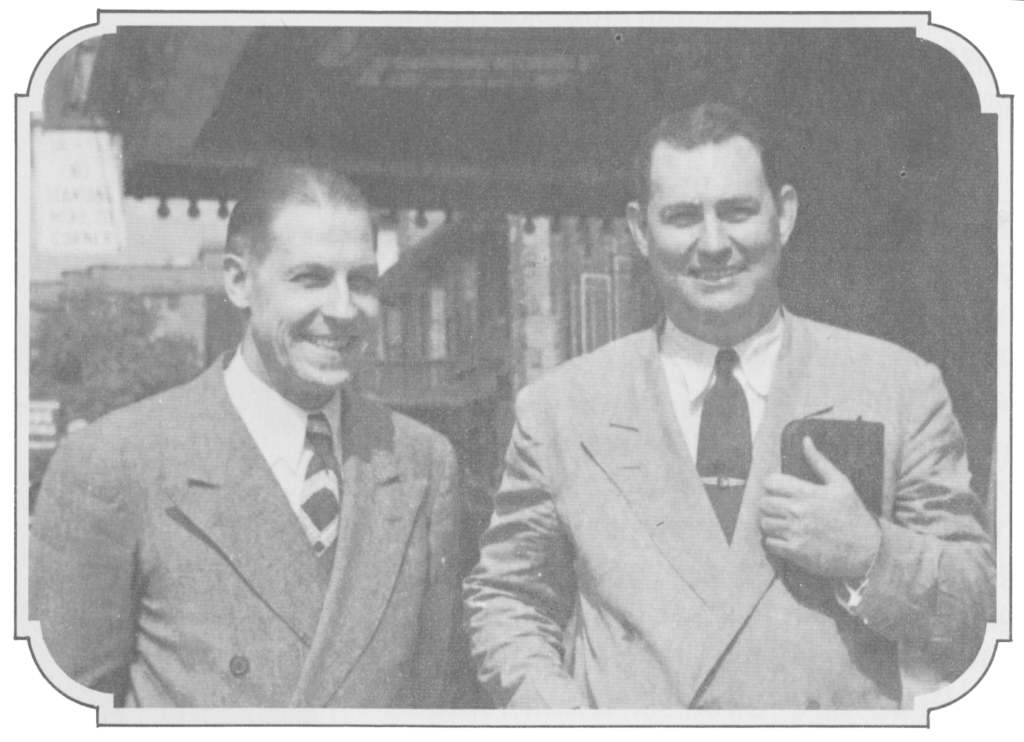
The World Fundamental Baptist Missionary Fellowship was an improvement over its precursor, the Baptist Bible Union, in many ways. The Baptist Bible Union had no systematic plan of financing as did the missionary Fellowship headed by Norris. The thrust of the Union was narrow and negative. During most of its history, its one purpose was to impede the progress of modernism in the Northern and Southern Baptist Conventions. It lacked a single self-enhancing program until the abortive Des Moines University fiasco in 1927. The World Fundamental Baptist Missionary Fellowship, however, emphasized church building programs, the enlisting of churches into its constituency, educational ventures, missionary endeavors, etc. The Baptist Bible Union also suffered from the muddled leadership provided by its presidential triumvirate; but Norris furnished his group with a capable (though admittedly unscrupulous), maximum leader who was able, at least temporarily, to effectively coalesce his followers. In short, the World Fundamental Baptist Missionary Fellowship seemingly possessed all the ingredients needed for a successful movement except managerial integrity. When the “hearing” staged by Norris closed, the World Fundamental Baptist Missionary Fellowship receded into the background; and the Baptist Bible Fellowship occupied center stage.
Other articles in the 70th Anniversary series …
- Reasons for the Baptist Bible Fellowship – by Noel Smith
- Separation from WFBMF and the Organization of the Baptist Bible Fellowship – by G.B. Vick
- The BBFI: A History – by Keith Bassham


